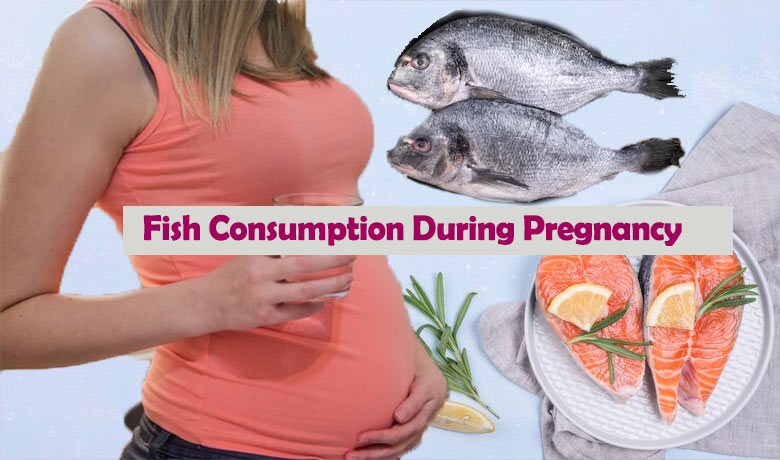Fish Consumption During Pregnancy

Fish consumption during pregnancy has been a topic of interest and concern among healthcare professionals and expectant mothers. While fish is a valuable source of essential nutrients, including omega-3 fatty acids and high-quality protein, it also poses potential risks due to environmental contaminants, such as mercury.
This article aims to provide a comprehensive overview of the benefits and considerations associated with fish consumption during pregnancy, helping women make informed decisions regarding their dietary choices.
Pregnancy is a critical period when proper nutrition plays a crucial role in the health and development of the fetus. Fish is known to be a rich source of nutrients, particularly long-chain omega-3 fatty acids, such as docosahexaenoic acid (DHA), which are vital for fetal brain and visual development. However, concerns regarding mercury contamination in certain fish species have raised questions about the safety and appropriate consumption levels during pregnancy.
Nutritional Benefits of Fish Consumption:
Fish provides numerous essential nutrients required for optimal fetal development. Omega-3 fatty acids, specifically DHA, contribute to the development of the fetal brain and eyes. They also offer potential benefits for maternal mental health. Additionally, fish is an excellent source of high-quality protein, vitamin D, iodine, and other minerals necessary for fetal growth.
Risks Associated with Fish Consumption:
Mercury, a naturally occurring heavy metal, can accumulate in certain fish species due to environmental contamination. High levels of mercury exposure during pregnancy can harm the developing nervous system of the fetus. Consequently, pregnant women are advised to avoid fish known to have high mercury content, such as sharks, swordfish, king mackerel, and tilefish.
Safe Fish Consumption Guidelines:
To maximize the benefits of fish while minimizing exposure to contaminants, pregnant women should follow specific guidelines. The U.S. Food and Drug Administration (FDA) and the Environmental Protection Agency (EPA) recommend consuming a variety of fish that are lower in mercury, such as salmon, trout, sardines, and shrimp. They suggest limiting fish intake to 2-3 servings (8-12 ounces) per week.
Cooking and Preparation Recommendations:
Proper cooking techniques can help reduce the risk of foodborne illnesses during pregnancy. It is essential to cook fish thoroughly until it reaches an internal temperature of 145°F (63°C) to kill any potential pathogens. Avoid consuming raw or undercooked fish, as it may contain harmful bacteria or parasites.
Fish Oil Supplements:
For pregnant women who do not consume fish or have dietary restrictions, fish oil supplements can be an alternative source of omega-3 fatty acids. However, it is crucial to consult with a healthcare provider before initiating any supplementation to ensure appropriate dosage and product safety.
Is it safe to eat fish during pregnancy?
Yes, it is generally safe to eat fish during pregnancy, but certain considerations should be taken into account. Fish is an excellent source of essential nutrients, such as omega-3 fatty acids, high-quality protein, and minerals, which are beneficial for both the mother and the developing fetus. However, the presence of environmental contaminants, particularly mercury, in some fish species can pose risks to fetal development.
Mercury is a naturally occurring heavy metal that can accumulate in certain predatory fish due to pollution in water sources. High levels of mercury exposure during pregnancy have been linked to potential developmental issues in the nervous system of the fetus. Therefore, it is important for pregnant women to be cautious about their fish consumption and choose fish with lower mercury levels.
To ensure the safety of fish consumption during pregnancy, it is recommended to follow the guidelines provided by regulatory agencies such as the U.S. Food and Drug Administration (FDA) and the Environmental Protection Agency (EPA). These guidelines suggest consuming a variety of fish that are known to be lower in mercury, such as salmon, trout, sardines, and shrimp. They also recommend limiting fish intake to 2-3 servings (8-12 ounces) per week.

It is important to note that certain fish species should be avoided during pregnancy due to their higher mercury content. These include sharks, swordfish, king mackerel, and tilefish. These fish are typically larger and higher on the food chain, which increases their mercury levels.
Proper cooking techniques should also be followed to reduce the risk of foodborne illnesses. Fish should be cooked thoroughly until it reaches an internal temperature of 145°F (63°C) to eliminate any potential pathogens.
If a pregnant woman does not consume fish or has dietary restrictions, fish oil supplements can be considered as an alternative source of omega-3 fatty acids. However, it is crucial to consult with a healthcare provider before starting any supplementation to ensure appropriate dosage and product safety.
In conclusion, fish can be safely consumed during pregnancy by following recommended guidelines and selecting fish with lower mercury levels. Regular communication with healthcare professionals is important to address individual health concerns and receive personalized dietary advice.
What fish is safe during pregnancy?
During pregnancy, it is generally safe to consume a variety of fish that are known to have lower mercury levels. These fish provide essential nutrients, including omega-3 fatty acids, without posing significant risks associated with mercury contamination. Here are some examples of fish that are considered safe to eat during pregnancy:
- Salmon: Salmon is an excellent choice as it is rich in omega-3 fatty acids and a good source of protein. It is also low in mercury, making it safe for consumption during pregnancy. Opt for wild-caught salmon whenever possible.
- Trout: Trout is another fish that is low in mercury and provides beneficial nutrients like omega-3 fatty acids. It is a good alternative to salmon and can be enjoyed grilled, baked, or broiled.
- Sardines: Sardines are small fish that are packed with omega-3 fatty acids and other important nutrients. They are generally low in mercury and can be enjoyed fresh or canned.
- Shrimp: Shrimp is a popular seafood choice during pregnancy. It is low in mercury and a good source of protein. Ensure that shrimp is cooked properly to reduce the risk of foodborne illnesses.
- Tilapia: Tilapia is a mild-flavored fish that is low in mercury and a good source of protein. It can be easily incorporated into various dishes and cooking methods.
- Cod: Cod is a white fish with low mercury levels. It is a versatile fish that can be baked, broiled, or grilled.
Remember, it is important to choose fish from reputable sources and ensure proper cooking to minimize the risk of foodborne illnesses. Pregnant women should still follow the recommended guidelines for fish consumption, which advise limiting intake to 2-3 servings (8-12 ounces) per week.
It is worth noting that fish from local waters or certain specific regions might have different contamination levels. It is advisable to consult local advisories or guidelines provided by health authorities in your region for more specific recommendations regarding fish consumption during pregnancy.
When should I avoid fish during pregnancy?
While fish can be a valuable part of a healthy diet during pregnancy, there are certain situations when it is advisable to avoid or limit fish consumption. Here are some instances when caution should be exercised:
- High Mercury Fish: It is important to avoid fish known to have high mercury levels during pregnancy. These include sharks, swordfish, king mackerel, and tilefish. These larger fish species are more likely to accumulate higher levels of mercury due to their position in the food chain.
- Raw or Undercooked Fish: Raw or undercooked fish may contain harmful bacteria, viruses, or parasites that can cause foodborne illnesses. To prevent the risk of infections such as salmonella or listeria, it is recommended to avoid consuming raw or undercooked fish during pregnancy.
- Uncooked Seafood: Seafood such as oysters, clams, and mussels are best avoided in their raw or partially cooked forms during pregnancy due to the potential risk of foodborne illnesses. These should be cooked thoroughly to eliminate any bacteria or pathogens.
- Local Fish Advisories: Depending on the region, there may be specific fish advisories due to contamination in local waters. It is important to consult local health authorities or advisories to determine if there are any specific recommendations or restrictions regarding fish consumption in your area.
- Allergies or Sensitivities: If you have known allergies or sensitivities to fish or seafood, it is recommended to avoid them during pregnancy to prevent allergic reactions or other adverse effects.
It is essential to discuss your specific dietary concerns and any potential risks with your healthcare provider. They can provide personalized advice based on your individual health, dietary preferences, and any specific considerations related to your pregnancy.
What fish are high in mercury while pregnant?
Certain fish species tend to have higher mercury levels and should be avoided or limited during pregnancy to minimize the potential risks associated with mercury exposure. Here are examples of fish that are known to be high in mercury:
- Shark: Shark is known to have one of the highest mercury levels among fish species. It is recommended to completely avoid sharks during pregnancy.
- Swordfish: Swordfish is another fish that typically contains high levels of mercury. Pregnant women should avoid swordfish due to its mercury content.
- King Mackerel: King mackerel is a large predatory fish that can accumulate higher levels of mercury. It is advisable to avoid king mackerel during pregnancy.
- Tilefish: Tilefish, particularly from the Gulf of Mexico, are also known for their higher mercury content. It is best to avoid tilefish during pregnancy.
These fish species are more prone to accumulating mercury due to their size, longevity, and position in the food chain. Mercury is a naturally occurring metal that can have harmful effects on the developing nervous system of the fetus.
To ensure safe and healthy fish consumption during pregnancy, it is recommended to focus on fish with lower mercury levels, such as salmon, trout, sardines, and shrimp. Following the guidelines provided by regulatory agencies, such as the U.S. Food and Drug Administration (FDA) and the Environmental Protection Agency (EPA), can help pregnant women make informed choices about fish consumption. These guidelines typically suggest limiting fish intake to 2-3 servings (8-12 ounces) per week and choosing fish with lower mercury levels.
What is the biggest risk of eating fish during pregnancy?
The biggest risk associated with eating fish during pregnancy is the potential exposure to high levels of mercury. Mercury is a naturally occurring heavy metal that can be found in various water bodies, including oceans and lakes. It enters the water through industrial pollution, coal-fired power plants, and natural processes like volcanic activity. Fish absorb mercury from the water as they feed, and larger predatory fish tend to accumulate higher levels of mercury over time.
Exposure to high levels of mercury during pregnancy can pose risks to the developing fetus. Mercury can cross the placenta and affect the developing nervous system, particularly the brain and the neurological development of the fetus. It may lead to developmental issues and cognitive impairments in the child.
The potential adverse effects of mercury on the developing fetus make it crucial for pregnant women to be mindful of their fish consumption and choose fish with lower mercury levels. Following the guidelines provided by regulatory agencies, such as the U.S. Food and Drug Administration (FDA) and the Environmental Protection Agency (EPA), can help mitigate the risk by providing recommendations on fish selection and consumption limits.
It’s important to note that the benefits of consuming fish during pregnancy, such as the intake of essential nutrients like omega-3 fatty acids, should also be considered. By selecting fish with lower mercury levels and adhering to safe consumption guidelines, expectant mothers can enjoy the nutritional advantages while minimizing potential risks to their developing babies. Consulting with healthcare professionals for personalized advice is recommended to address individual concerns and ensure a healthy and balanced diet during pregnancy.
Can I eat fish in the first trimester?
Yes, you can eat fish during the first trimester of pregnancy. In fact, consuming fish in the early stages of pregnancy can provide valuable nutrients that support the development of the fetus. However, it is important to make informed choices and follow the guidelines for safe fish consumption.
During the first trimester, the developing fetus undergoes rapid growth and development, including the formation of the neural tube and organ systems. Nutrients like omega-3 fatty acids, high-quality protein, and minerals found in fish can contribute to healthy fetal development.
To ensure the safety of fish consumption during the first trimester, consider the following:
Choose fish with lower mercury levels: Select fish that are known to have lower mercury levels, such as salmon, trout, sardines, and shrimp. These fish provide essential nutrients while minimizing the risk of mercury exposure.
Follow safe consumption guidelines: Adhere to the recommended guidelines provided by regulatory agencies like the U.S. Food and Drug Administration (FDA) and the Environmental Protection Agency (EPA). These guidelines typically suggest limiting fish intake to 2-3 servings (8-12 ounces) per week.
Ensure proper cooking: Cook fish thoroughly until it reaches an internal temperature of 145°F (63°C) to eliminate any potential bacteria or pathogens that may be harmful during pregnancy.
By following these guidelines, you can enjoy the benefits of fish consumption while minimizing potential risks. It is always recommended to consult with your healthcare provider for personalized advice and to address any specific concerns you may have during the first trimester of pregnancy.
Conclusion:
Fish consumption during pregnancy offers valuable nutritional benefits, particularly in terms of omega-3 fatty acids and other essential nutrients. By following safe fish consumption guidelines, expectant mothers can enjoy the advantages while minimizing the potential risks associated with environmental contaminants. Regular communication with healthcare professionals is vital to ensure individualized recommendations based on personal health history and dietary preferences.
